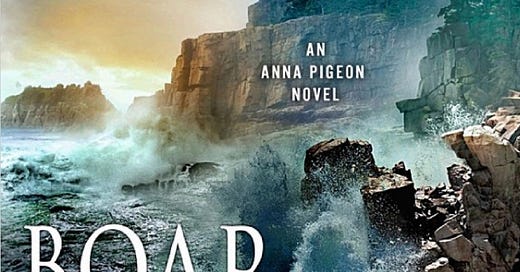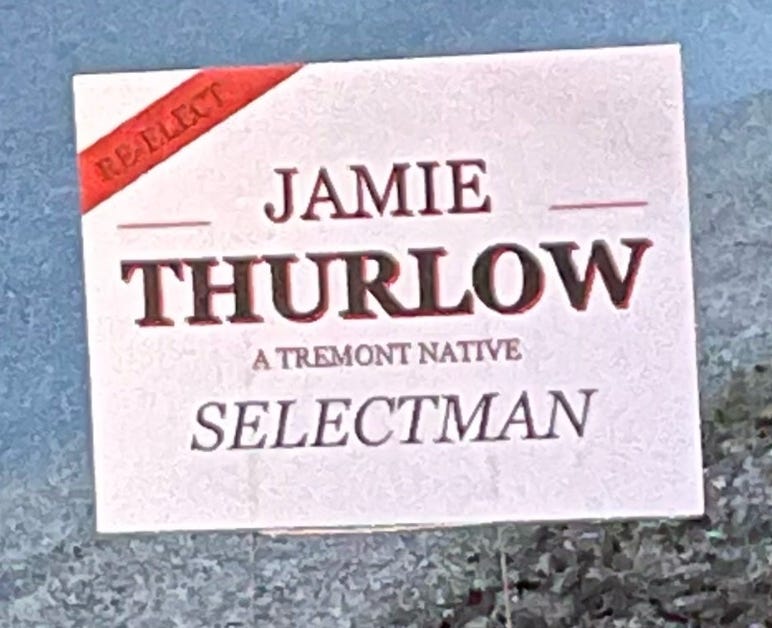MOUNT DESERT, April 14, 2025 - On my many long drives to Maine, audio books have become a great savior and companion, especially because it only takes about 45 minutes before NPR begins to repeat itself.
That’s when I default to listening to books - particularly ones with a strong Maine connection.
I am a avowed junkie of Paul Doiron’s series about a game warden in Maine. I have listened to every book in the series, except for two which I am saving for this summer. There is symmetry in listening to the warden’s adventures while driving through the state’s central spine - Auburn, Augusta, Skowhegan, Waterville, Bangor.
Doiron calls out real places, like Weathersby’s fishing camp on Grand Lake Stream, and even its owner Jeff McEvoy. And just for an additional dollop of authenticity, Doiron, in one book, actually walked me down virtually to the Pine Street Store, about 75 yards from Weathersby’s. As anyone who’s ever been there, a fishing trip to Grand Lake Stream is not complete until you’ve spent time in Pine Tree Store.
Now comes Tom Ricks with his second novel based in Maine, “We Can’t Save you,” due out June 3. Ricks is using a similar literary theme - a law enforcement officer with plenty of personal baggage not trusted by the locals. In his case, the person is an FBI agent, even more of a outsider than the Maine-bred game warden.
This is a rich genre. Besides Doiron and Ricks, there is Navada Barr, a former law enforcement ranger, who has authored 19 books anchored by her protagonist Anna Pigeon.
In 2016, Barr published “Boar Island,” a tale of how Pigeon, who was about to start her new post as acting chief ranger at Acadia National Park, was recruited by a friend to protect her daughter from a stalker. The three moved east to an island off the Maine coast, but the stalker followed them. Meanwhile, Pigeon had barely arrived at Acadia before a brutal murder is committed by a killer uncomfortably close to her.
C. J. Box is the most celebrated of the genre with 31 novels including 25 of the the Joe Pickett series.
I started reading Box, but gave it up in favor of books about Maine and the references to places and events more familiar to me. I felt the same way about Nevada Barr’s non-Maine books.
The tension between Maine “natives” and folks “from away” is a recurring theme with which I have developed a special attachment, probably because I feel that tension in everything I’ve witnessed and written about on this island.
Ricks and Doiron are Yalies - about 10 years apart. Yet neither has taken on his alma mater in any of their novels.
Maybe it’s a Skull and Bones thing - Yale’s cloak-and-dagger senior class secret societies which gave members easy entry into the CIA in the Fifties and Sixties. Some say that was the genesis of the Deep State. Failing that as a career, some Yalies wrote books.
My conspiracies-addled brain thinks Ricks and Doiron are missing out on an obvious winner - a serial killer who hunts down tribal leaders who dare to challenge Yale’s timber hegemony.
Yale is one of the biggest landowners in Maine. Its endowment owns more than 521,000 acres in Maine’s Unorganized Territory, according to 2019 data from the Maine Revenue Services. In 2009 Yale reported it owned about 3 million acres of land, or roughly the size of Connecticut.
Maybe Warden Mike Bowditch and Agent Ryan Tapia should team up to capture a villain who is a Yale forestry professor seeking to expose Yale’s dark impulses in rural America.
Co-authors. Why not?
Southwest Harbor’s own Christina Baker Kline has co-authored her next book with Anne Burt. “Please Don’t Lie” has been described as a “psychologically rich and bone-chilling … serpentine and timely thriller.” It’s due out Sept. 1.
(I recently finished "Mad Honey" by Jodi Picoult and Jennifer Finney Boylan, co-authors who effectively nemployed voices of the main characters as letters. The book with a strong trans-gender bent had been banned in Florida.)
Ricks is actually a lansman, although a much more celebrated one. He won two Pulitzer Prices as a reporter.
While at the Wall Street Journal, he was one of the reporters writing the "Price of Power" series about defense spending and the US military after the Cold War. The series won the Journal the 2000 Pulitzer Prize for National Reporting. He won a second Pulitzer Prize for National Reporting in 2002 as part of The Washington Post team for reporting about the beginnings of the U.S. counteroffensive against terrorism.
Ricks was a finalist for the 2007 Pulitzer Prize for General Nonfiction for his book Fiasco: The American Military Adventure in Iraq.[13]
Ricks was immensely critical of Fox News' coverage of the 2012 Benghazi attack. While being interviewed by Jon Scott, Ricks accused Fox News of being "extremely political" in its coverage of the attack and stated, "Fox was operating as a wing of the Republican Party."[14]
In his latest book, Ricks appears to be building a series. FBI agent Tapia is on his second prowl - this time when a group of young Native Americans launches a series of protests against climate change and its effects on the waters and woods of Maine,
Ricks and Doiron share a propensity to use real-life references which hook the reader.
In “Everybody know but you,” there was an exchange between a drug dealer who knew how to make his way around all the locals in a Downeast town and an FBI agent investigating a murder:
“Let me tell you this, most of the rest of the coast lost control of their places,” the drug dealer told the agent.
“Outsiders came in and took over the land, the politics, the schools. There's a town over on Mount Desert Island called Tremont. The locals running for selectmen put ‘Tremont Native’ on their roadside signs.
“It's kind of pathetic, if you have to say it, you've already lost control.
“Here … we know who our natives are. No one needs to be told, and we run the island, not the from-aways.”
Ricks invoked an actual event - the municipal election in Tremont three years ago when Jamie Thurlow sought re-election to the select board. Thurlow was criticized for the sign. One letter in the local paper stated, “What matters more than where we were born is how we listen, whom we involve, how we collaborate and how we lead.
“If you go back far enough, we’re all from away.“
Real people, real references, real catnip for readers.
FOOTNOTE: I employ audio apps from Northeast Harbor Library, Southwest Harbor Public Library and a library in Connecticut - Hoopla, Libby and Cloud Library. Retention suffers when listening to a book, and I often have to rewind sections. It’s not ideal to listen to books which have a permanent place in my home library, such as Ruth Moore’s 1946 classic “Spoonhandle” or Colin Woodard’s “The Lobster Coast.” Every summer, I reread David Foster Wallace’s hilarious essay, “Consider the Lobster.”
But the theme here is books about Maine. To that end, the newsletter Maine published “The Essential Maine Reading List” in 2020. I’ve read about half of the books chosen by a poll of the magazine’s editors. Some I read so long ago like Thoreau’s “Maine Woods” that it’s time for another read. I’ll do that between Ricks and Kline’s books this summer.
CORRECTION: A missing paragraph break confused some readers in my post from last night. The candidates for the Bar Harbor Warrant Committee are:
Committee secretary Louise Lopez.
Long-time incumbent Robert Chaplin.
Local artist Vicky Smith.
Resident Tammy Bloom.
Resident Timothy Smith.
John Kelly, deputy superintendent at Acadia National Park.
Eben Salvatore.
Town Hill resident Michael Good and interim councilor Megan Kelly, who are vying for the remaining two years of Kelly’s term, which she vacated to fill Kyle Shank’s vacancy.






Thanks for the list. You and others might enjoy Lewis Robinson's Officer Friendly, a great set of short stories about Maine.
Thanks! Fwiw, here is my list of my favorite books about Maine:
https://crimereads.com/five-great-books-about-maine-from-thomas-e-ricks/